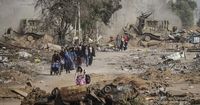In a significant escalation of violence, at least 29 Palestinians have been reported killed in Israeli airstrikes on the Gaza Strip within the last 24 hours, according to Al Jazeera. The latest strikes follow a deadly attack on a residential area in the al-Shujaya district of eastern Gaza City on April 9, 2025, which claimed the lives of 35 individuals, prompting widespread outrage and condemnation.
The renewed military operations mark a stark departure from the ceasefire that had been in place since January 2025. On March 18, the Israeli army resumed its offensive in Gaza, launching extensive strikes that have drawn criticism from various quarters. Israeli Prime Minister Benjamin Netanyahu’s cabinet justified the military actions by citing Hamas's rejection of proposals put forth during recent negotiations facilitated by international mediators, including U.S. President’s special envoy Stephen Witkoff. The Israeli government stated that the primary goal of these operations is to rescue hostages believed to be held by Hamas.
As the conflict intensifies, the Israeli Defense Forces (IDF) reported that they have destroyed numerous terrorist infrastructures across Gaza in a series of operations conducted overnight and into the morning. An IDF spokesperson confirmed that 35 buildings and tunnels linked to militant activities were detonated within a 24-hour period. "IDF forces continue to operate in the Gaza Strip and destroy dozens of terrorist infrastructures in the area," the spokesperson stated. They added that airstrikes targeted approximately 35 locations associated with terrorist organizations during this timeframe.
Ground operations have been concentrated in areas such as Rafah and the Tel Sultan neighborhood, with Division 36 forces actively engaged in eliminating threats and establishing operational control. The IDF has also reported the destruction of several shafts leading to underground facilities used by terrorist groups. The military's ongoing campaign has been characterized by a combination of air and ground assaults aimed at neutralizing perceived threats.
While the Israeli government maintains that these operations are necessary for national security and the protection of its citizens, critics argue that the escalation of violence disproportionately affects civilians. Radicals have pointed fingers at both Israel and the United States for the resurgence of hostilities, claiming that external pressures have exacerbated the situation.
The humanitarian implications of the renewed conflict are dire. Rescuers are currently engaged in a frantic search for missing individuals in the wake of the al-Shujaya airstrike, with many families left in despair as they await news of their loved ones. The ongoing violence has sparked widespread protests and calls for international intervention, as the toll on civilians continues to rise.
International responses to the situation have varied, with some nations calling for immediate ceasefires and others supporting Israel's right to defend itself against what it describes as terrorist threats. The United Nations has expressed concern over the humanitarian crisis unfolding in Gaza, urging both sides to exercise restraint and prioritize the safety of civilians.
As the situation develops, the international community watches closely, hoping for a resolution that can bring an end to the violence. With both sides entrenched in their positions, the path to peace appears fraught with challenges. The urgency of the matter is underscored by the recent spike in casualties and the destruction of vital infrastructure in Gaza, raising fears of a prolonged conflict that could have lasting repercussions for the region.
In conclusion, the resurgence of violence in Gaza has led to significant loss of life and destruction, with both sides blaming each other for the escalation. As military operations continue, the humanitarian crisis deepens, prompting urgent calls for a ceasefire and renewed diplomatic efforts to address the underlying issues fueling the conflict.




